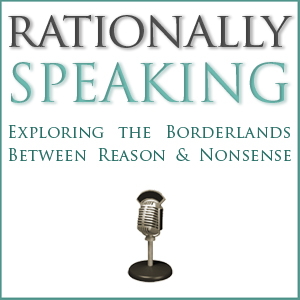Rationally Speaking #186 - Tania Lombrozo on "Why we evolved the urge to explain"
Rationally Speaking Podcast
New York City Skeptics
4.6 • 787 Ratings
🗓️ 11 June 2017
⏱️ 69 minutes
🧾️ Download transcript
Summary
Transcript
Click on a timestamp to play from that location
| 0:00.0 | Today's episode of Rationally Speaking is sponsored by Givewell, a nonprofit dedicated to finding outstanding charities and publishing their full analysis to help donors decide where to give. |
| 0:09.2 | They do rigorous research to quantify how much good a given charity does, how many lives does it save, or how much does it reduce poverty per dollar donated. |
| 0:17.4 | You can read all about their research or just check out their short list of top recommended evidence-based charities to maximize the amount of good that your donations can do. It's free and available to everyone online. Check them out at give well.org. I also want to let you all know about this year's Northeast Conference on Science and Skepticism, being held in New City, June 29th through July 2nd. |
| 0:38.3 | I'll be there taping a live podcast, and there will be lots of other great guests, including |
| 0:42.4 | the skeptics guide to the universe, my former co-host, Massimo Piliucci, the amazing James |
| 0:47.4 | Randy, and keynote speaker Mike Massimino, former NASA astronaut. |
| 0:51.9 | Get your tickets at nexus.org, n-E-C-S-S-S-org. |
| 1:09.4 | Welcome to Rationally speaking, the podcast where we explore the borderlands between reason and nonsense. |
| 1:15.0 | I'm your host, Julia Gaelas, and I'm here with today's guest, Professor Tanya Lombroso. |
| 1:20.2 | Tanya is an associate professor of psychology at the University of California, Berkeley. |
| 1:24.9 | She's also an affiliate in the philosophy department and the |
| 1:27.8 | director of the Concepts and Cognition Lab. Tanya, welcome to the show. Thanks for having me, Julia. |
| 1:32.8 | So Tanya's research is, as it is, situated at the intersection of philosophy and cognitive science |
| 1:41.5 | and asks questions both about how humans reason and how they |
| 1:45.6 | theoretically, normatively should reason, it is all utter Julia Bates. And so it was very hard |
| 1:52.4 | to pick an area to focus on for today's episode. But the aspect of your research, Tanya, |
| 1:58.6 | that I was hoping to focus on today is the research on |
| 2:01.6 | explanation. So people are constantly reaching for explanations about the world. Like, |
| 2:07.8 | a tragedy happens and we want to explain why did this happen, or we want to explain patterns |
| 2:14.0 | that we see in the world. Like, why are some people successful and other people aren't? And so one of the many things that Tanya's work looks at is, what kinds of explanations |
| 2:23.8 | do we reach for? Like, for example, do we have a bias in favor of simple explanations over complicated |
| 2:29.2 | explanations? And to the extent that we have this bias, is it justified? What is, you know, does it make us more |
... |
Please login to see the full transcript.
Disclaimer: The podcast and artwork embedded on this page are from New York City Skeptics, and are the property of its owner and not affiliated with or endorsed by Tapesearch.
Generated transcripts are the property of New York City Skeptics and are distributed freely under the Fair Use doctrine. Transcripts generated by Tapesearch are not guaranteed to be accurate.
Copyright © Tapesearch 2025.

